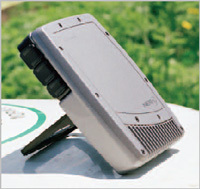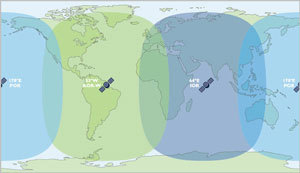Stratos offers satellite-based broadband service
Satellite phones have been around for years, but Stratos adds a twist to satellite communication: The company offers satellite broadband access in most places of the world. Using a compact satellite terminal weighing two pounds, users can surf the web, upload video or even broadcast the news from remote parts of the world at up to 492 kbps (downstream). Stratos officials say that the system has been a hit with big game hunters, military personal and of course the broadcast news reporters.
While the company sells several models, the most interesting may be the Nera WorldPro 1000, smaller and lighter than most laptops. It can send data upstream at 240 kbps and receive data at 384 kbps. Regular voice calls at 4 kbps are supported via Bluetooth or via an analog phone connection. The unit also has USB and Ethernet ports. An internal rechargeable battery can last around five hours of regular usage or 36 hours on standby. Stratos sells other models which can go up to 492 kBps.
The system apparently has been a great success with broadcast stations and the military. Doug Gunster, Communications Manager for Stratos, told TG Daily that the Nera WorldPro units could also be popular with extreme travelers. "Mountain climbers or those guys who cross the Atlantic by themselves would use this," says Gunster. Dave Brengelmann, Western US Director of Stratos, adds, "If you wanted to run your webpage from the top of a mountain in Nepal, you can do it with our devices."
Stratos' service runs off two Inmarsat satellites that were launched last year. The Middle East, Europe and Asia already accesses service from the first satellite, while North America and South America will use the second satellite and come online in the second quarter of this year. Both satellites were launched last year to cover the whole globe. According to Stratos, it takes several months of testing to make the satellites commercially available. "It takes time for the engineers to run tests on the electronics and the solar panels. We are actually on the fast side," says Gunster.
Will the new satellites have enough capacity to handle thousands or even tens of thousands of units? According to Gunster, yes. The new satellites have much more capacity and rather than a single beam covering an area, they support several spot beams that can be reallocated for greater local capacity. Gunster told us that, for example in emergency situations, everything can be aimed to an area.
The satellite terminals from Stratos are a far cry from the older generation satellite gear. "You were able to get voice satellite calls, but this is a whole different level of service," says Gunster. He told us that customers often ask, "Where is the antenna?" when looking at the newer integrated models. A small integrated patch antenna replaces the big dish of older satellite gear. In addition, the antenna has a wide beam width that lets users acquire a decent satellite signal much quicker than older parabolic dishes.
The systems currently offered cost somewhere between $1500 to $5000 each depending on what types of features you want. "People are surprised about the price, because the previous generation cost tens of thousands of dollars," says Gunster. He also told us that voice airtime is around $1 per minute, but added, "If you are a heavy user, there are packages that will save you some money."
Get Tom's Hardware's best news and in-depth reviews, straight to your inbox.
Both voice and data are done as a "pay as you go" system. In the long run this saves users money because the phones are generally used sporadically. Gunster says, "You may only use it for a few weeks in a remote location. You only pay for that usage."
The company worked with FEMA and other law enforcement agencies after the 9-11 attacks and Hurricane Katrina. While the average consumer may not understand why a satellite phone may be needed in an area with existing cellular phone coverage, Gunster says, "If something happens, that service may be unavailable or overwhelmed. The cell phone towers can be OK, but imagine what happens when everyone picks up their phone."
Humphrey Cheung was a senior editor at Tom's Hardware, covering a range of topics on computing and consumer electronics. You can find more of his work in many major publications, including CNN and FOX, to name a few.

